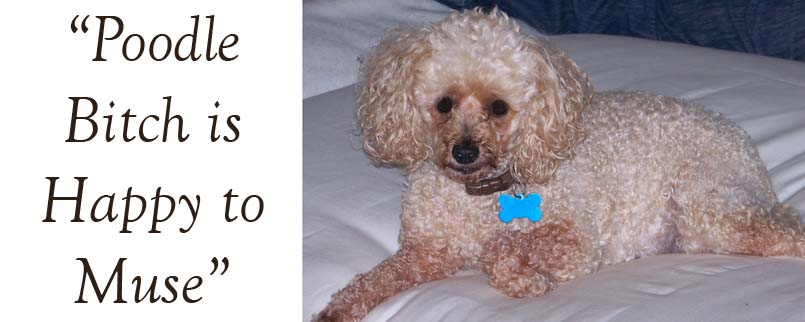In his new book Amazing Dogs: A Cabinet of Canine Curiosities, Cardiff University historian Jan Bondeson mines obscure German periodicals to reveal the Nazis' failed attempt to breed an army of educated dogs that could read, write and talk. "In the 1920s, Germany had numerous 'new animal psychologists' who believed dogs were nearly as intelligent as humans, and capable of abstract thinking and communication," he writes. "When the Nazi party took over, one might have thought they would be building concentration camps to lock these fanatics up, but instead they were actually very interested in their ideas."
Poodle Bitch isn't sure why a human who believed that "dogs were nearly as intelligent as humans" should be considered a "fanatic," but his comment has prompted Poodle Bitch to scratch Mr. Bondeson's new book off her summer reading list.
Poodle Bitch found The Sun's much less dry take on the story, in particular some specifics about a school that was set up to train the dogs, more entertaining than Time's:
Star pupil at the school near Hanover, Germany, was Aire- dale terrier Rolf. He tapped out letters of the alphabet with his paws and was said to have speculated about religion and learnt POETRY.
He reportedly asked a visiting noblewoman: "Could you wag your tail?" Another mutt was said to have uttered the words "Mein Fuhrer" when asked who Hitler was - while another imitated a human voice to bark: "Hungry! Give me cakes" in German.
Other ludicrous experiments saw so-called scientists test telepathic communications between humans and dogs.
Poodle Bitch doubts very much that Rolf was anything more than a very clever canine who found himself in a difficult situation and made the best of it in order to survive. She has found that humans who want to believe in something -- who desperately want to believe in something -- can be made to believe in that something with only the barest of outside help. Poodle Bitch cites the allegedly "guilty" dog, Denver, who recently sent the internet into a tizzy, and Sonny, the dog who could supposedly "read."
These dogs were playing along for the benefit of their human companions. Dogs like to make their human companions feel good. And, Poodle Bitch dryly notes, to get rewards. Because humans are basically good, this is a mostly harmless exercise. However, Poodle Bitch notes with sadness that there are those who, for instance, run dog fighting rings, who exploit this feature of the canine personality for nefarious ends. Then there are the so-called "drug sniffing dogs," who are wrong more than half the time about the presence of drugs, but are right 100% of the time in trying to make their human co-workers happy.
But back to the Nazis: Rolf et al had no idea that these humans were working toward malefic ends. They just wanted to make them happy; so they followed the cues they were given. The humans, in turn, were part of a dangerous, powerful movement centered around a murderously deranged man who was apparently "a well-known dog lover," (as the TIME article ludicrously puts it) and a "barking-mad pet lover" (as the Sun article absurdly puts it) and very much wanted his silly program to succeed. So there were powerful motivations all around to show some measure of success.
She feels safe in declaring that the Nazi attempt to create a race of super dogs who would help them run their concentration camps was essentially a non-starter.

Some dogs will do anything for a treat.




